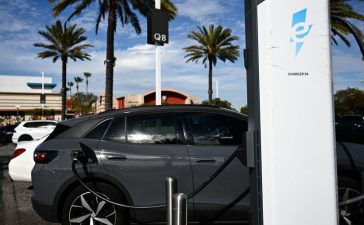The energy watchdog has set out plans that would result in households paying an extra £16 on top of their energy bills to help suppliers recover almost £3bn in bad debts from customers struggling to pay bills.
Ofgem said the one-off extra charge, which would be levied at £1.33 a month on bills paid between April next year and March 2025, was to “protect the market and consumers” after figures showed energy debt had hit a record £3bn.
The level of bad debt, which refers to the amount of money owed by customers that is unlikely to realistically be repaid, has soared because of increases in wholesale energy prices and the wider cost of living crisis putting pressure on household finances.
“We know that cost of living pressure is hitting people hard and this is evident in the increase in energy debt reaching record levels,” said Tim Jarvis, the director general for markets at Ofgem.
“The record level of debt in the system means we must take action to make sure suppliers can recover their reasonable costs, so the market remains resilient, and suppliers are offering consumers support in managing their debts.”
Ofgem, the energy regulator for Great Britain, said this one-off move would be less costly to consumers than if suppliers were forced out of business.
When wholesale energy prices began to rise in 2021, and soared dramatically after Russia’s invasion of Ukraine last year, about 30 energy companies went out of business.
Ofgem said this led to every UK energy customer being charged an extra £82 to cover the costs of making sure that households were not cut off.
The regulator said the consultation on the proposal would include the energy industry, consumer groups and the public.
“The proposals set out today are not something we take lightly,” Jarvis said. “However, we feel that they are necessary to address this issue. This approach will ensure the costs are recovered fairly, without penalising a particular group of customers.”
The proposed plan does not include passing extra costs on to customers who use prepayment meters (PPM). This is because they operate on a top-up system so PPM customers do not build the same debt level as credit customers.
Ofgem said other industry sectors already “commonly make provisions” within their prices for bad debt costs and that the energy sector could do so within the price cap mechanism to ensure these costs were “recovered as fairly and efficiently as possible”.
after newsletter promotion
Since the beginning of the year, the energy price cap, the regulated cost of the average annual dual-fuel bill in Britain, has fallen from £2,500 to £1,928 from January 2024.
“The price cap has helped to protect consumers from a volatile gas market,” Jarvis said. “However, it remains a blunt instrument in a changing energy sector, and the way it works may need to change in the future, so customers continue to be protected.”
Campaigners criticised the move arguing that energy companies continue to rake in billions in profits, while many consumers are struggling with their bills.
“This outrageous tax on energy consumers is simply not fair,” said Simon Francis, coordinator of the End Fuel Poverty Coalition. “Energy suppliers have posted billions in profits already this year while millions of people struggle in cold damp homes. The record levels of energy debt are due to Britain’s broken energy system, not the fault of the hard-pressed public.”











